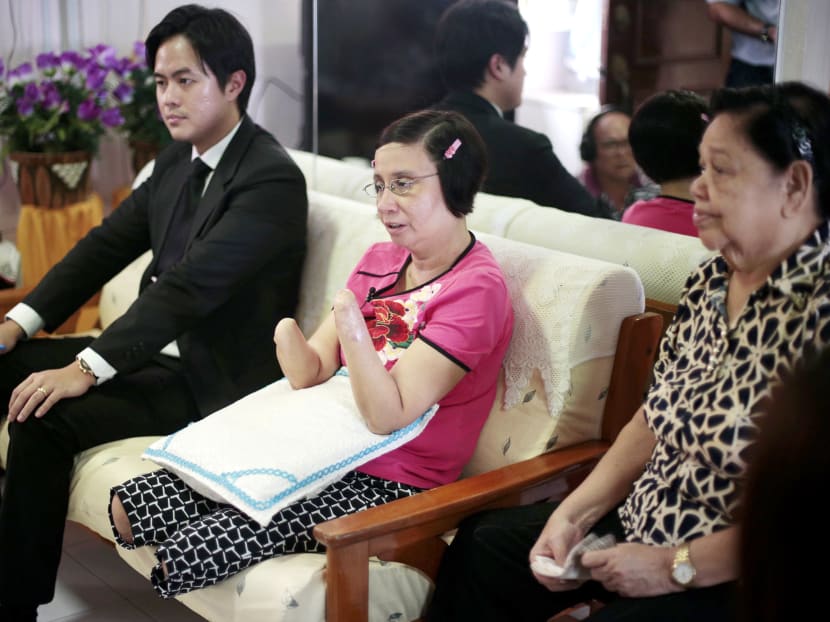Amputee suing SGH, doctors for negligence; seeking over S$8m
SINGAPORE — A 51-year-old woman is suing the Singapore General Hospital (SGH) and two of its doctors for negligence, after going through what was supposed to be a “simple, straightforward and low-risk” procedure that she alleged caused her to lose her hands and lower legs.

Ms Sarina Kaur (centre) with her mother and lawyer at a press conference at her home on Nov 6, 2015. Photo: Jason Quah
SINGAPORE — A 51-year-old woman is suing the Singapore General Hospital (SGH) and two of its doctors for negligence, after going through what was supposed to be a “simple, straightforward and low-risk” procedure that she alleged caused her to lose her hands and lower legs.
Ms Sarina Kaur is claiming that in 2012, the doctor proceeded with an elective procedure without properly informing her of test results showing she had bacteria in her urine. An infection eventually led to complications and gangrene in all four of her limbs, and she had to undergo amputation.
She is seeking more than S$8 million from the beleaguered hospital — already under scrutiny over the hepatitis C outbreak reported last month — to cover the cost of prostheses, future medical and daily expenses, and travel expenses to the United Kingdom for procedures concerning prostheses. The prostheses that Ms Kaur is seeking, estimated to cost around S$7 million, were recommended by Tan Tock Seng Hospital’s Foot Care and Limb Design Centre.
Court documents detailing Ms Kaur’s medical history showed that she was diagnosed with multiple sclerosis by SGH in 1979 and was undergoing long-term steroid treatment. Since 2008, she has also suffered from recurrent urinary tract infection and was found to have vesico-ureteric reflex, which caused a backflow of her urine from the bladder to the kidney.
When she was referred to SGH’s Head of Department of Urology Ng Lay Guat in 2012, Dr Ng recommended a Deflux procedure, which would make it harder for urine to flow back up the kidneys. The procedure was scheduled for Nov 20 that year. Pre-admission test results on Nov 17 showed that Ms Kaur’s urine had multi-resistant Escherichia Coli bacteria, but Dr Ng decided to proceed.
Ms Kaur is arguing that Dr Ng was negligent for not informing her of the infection or its associated risks, given her weakened immune system from steroid treatment. She also claimed Dr Ng was negligent for proceeding with the surgery instead of treating the infection first, as the procedure did not need to be carried out immediately. Instead, Dr Ng gave her a broad-spectrum antibiotic, which was also prescribed daily following the procedure.
On the night after the procedure, Ms Kaur developed a fever and became hypotensive. Dr Du Jingzeng, a medical officer on duty, diagnosed her with “likely sepsis”. But he did not treat her with a higher dosage or stronger antibiotics, nor did she consult senior doctors on call.
The next morning during a ward round, Dr Ng and her team did an ultrasound scan and found that Ms Kaur’s right kidney was swollen. Court papers said Dr Ng and her team “did not, in accordance with standard management” immediately relieve the swelling and/or obstruction in the kidney, drain the infected urine or effectively treat the infection.
By then, Ms Kaur had developed severe septic shock and was transferred to the Surgical Intensive Care Unit at about 10.10pm. Over the next few days, her condition worsened and she developed “multiple and critical conditions” including respiratory distress syndrome, severe septic shock, multiple organ failure and gangrene in all four limbs. On Dec 1, she had both her legs amputated at the knee. Her arms were amputated at the wrists on Jan 7, 2013, and her right forearm underwent higher level amputation on Jan 31.
Ms Kaur’s lawyers also submitted a specialist medical report by Dr Lee Soon Tai, consultant orthopaedic surgeon at the Osteoporosis Clinic & Orthopaedic Surgery at Mount Elizabeth Medical Centre. In his report, Dr Lee said: “Sarina had suffered numerous surgeries and pain following the urological procedure when bacteria from the urinary bladder spread and led to septicaemic shock. The septicaemic shock and subsequent management with inotropic support had led to the eventual loss of her upper and
lower limbs.”
Ms Kaur, who is single and worked as a receptionist before the incident, said she is no longer able to work or do simple things like open drawers or pick up a phone. She lives with her retired 78-year-old mother, Madam Nita Goonetilleke, who is caring for her with the help of a domestic worker.
It was only after unsuccessful discussions with the hospital that Ms Kaur started court proceedings. Her lawyer Jenson Lee, director at Engelin Teh Practice LLC, told reporters at a meeting in Ms Kaur’s home today (Nov 6) that they are prepared not to pursue further action if a settlement can be reached. “If there’s something she’s comfortable with, she is prepared to not proceed with proceedings. She just wants to live a normal life as soon as possible,” he said.
A pre-trial conference has been scheduled for Jan 7.






